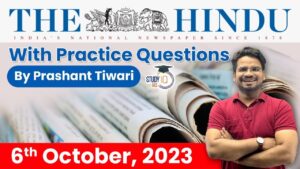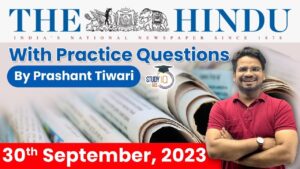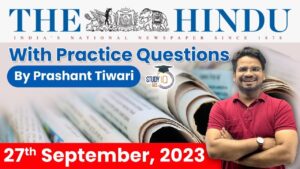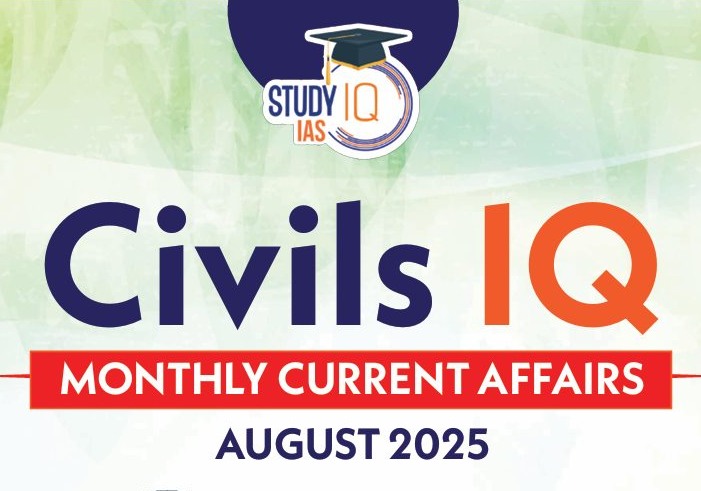The Hindu Newspaper Analysis for UPSC

The Hindu Newspaper Analysis 7 June 2023

The Hindu Editorial Today
- Minimum support price (MSP)
- Meaning:
- The MSP for a crop is the price at which the government is supposed to procure/buy that crop from farmers if the market price falls below it.
- MSPs provide a floor for market prices, and ensure that farmers receive a certain “minimum” remuneration so that their costs of cultivation (and some profit) can be recovered.
- Objective:
- The government incentivises the production of certain crops, thus ensuring that India does not run out of staple food grains.
- MSPs create the benchmark for farm prices not just in those commodities for which they are announced, but also in crops that are substitutes.
- Crops covered:
- 7 types of cereals (paddy, wheat, maize, bajra, jowar, ragi and barley)
- 5 types of pulses (chana, arhar/tur, urad, moong and masoor)
- 7 oilseeds (rapeseed-mustard, groundnut, soyabean, sunflower, sesamum, safflower, nigerseed)
- 4 commercial crops (cotton, sugarcane, copra, raw jute)
Who decides what the MSP would be and how?
- The MSPs are announced by the Union government and as such, it is the government’s decision.(Cabinet Committee on Economic Affairs)
- But the government largely bases its decision on the recommendations of the Commission for Agricultural Costs and Prices (CACP).

- Cyclonic Storm “Biporjoy” intensifies in the Arabian Sea, posing significant risks and uncertainties for the affected regions. The India Meteorological Department (IMD) reports the storm’s rapid development, expecting it to strengthen into a severe cyclonic storm with winds reaching 115-125 kmph and gusts of 140 kmph on June 8, 2023.
- The name ‘Biparjoy’ (meaning calamity or disaster) was given by Bangladesh.
- The formation of Cyclone “Biporjoy” in June is unusual, and the increasing sea surface temperatures in the Arabian Sea, attributed to climate change, play a significant role. These higher temperatures, reaching 30-32 degrees Celsius, favour the intensification of cyclones.
- The cyclonic system also poses a threat to the southwest monsoon in India, hindering its arrival and progression. By diverting moisture away from India, the storm could further delay the monsoon onset. Climate scientists point out the potential influence of long-term Indian Ocean warming and the developing El Nino, both of which can weaken the monsoon.


- In its 279th Report, the Law Commission of India has recommended the retention of Section 124A of the Indian Penal Code which contains the Law of Sedition. It has also recommended enhanced punishment for this offence in the name of national security.
- While Section 124A provides for a minimum imprisonment of three years, the commission recommends a minimum of seven.
- In 2022, the Supreme Court of India had ordered a stay on all existing proceedings and also on the registration of fresh cases (S.G. Vombatkere vs Union of India) under sedition upon the Union Government assuring the Court of a review of this law at the earliest.
- The Court’s stay order was in consideration of the fact that this law was widely misused by the law enforcement authorities.
- An offence against government, not country.
- The law of sedition was defined and applied in two different ways during the British period. The first major case was Queen Empress vs Bal Gangadhar Tilak 1897 in which the Bombay Court found Bal Gangadhar Tilak guilty of sedition for writing a couple of articles in Kesari, a Marathi weekly, invoking Shivaji, which was interpreted as exciting disaffection towards the British government.
- The second case was Niharendu Dutt Majumdar And Ors. vs Emperor which was decided by the Federal Court. Acquitting the accused Majumdar, Sir Mauris Gwyer, Chief Justice, explained the law as: “Public disorder or the reasonable anticipation or likelihood of public disorder is thus the gist of the offence.”
- These two statements of the law of sedition given by two courts in British India differ from one another. One defines sedition as disaffection, which was interpreted as ‘political hatred of government’ and comes within the mischief of sedition. The other interprets it to mean that the offence is committed only when there is incitement to violence or disorder.
- Kedarnath vs State of Bihar (1962)
- Kedarnath decided the constitutionality of sedition. The Court held that it is constitutionally valid for two reasons. One, sedition, though an offence against the government, is against the state because the government is a visible symbol of state and the existence of the state will be in jeopardy if the government is subverted. Second, Article 19(2) imposes restrictions in the interest of the security of the state which has wider amplitude and which includes the law on sedition.
- The sedition law, enshrined in Section 124A of IPC, was introduced by the British government in 1870 to tackle dissent against colonial rule.
- Mahatma Gandhi called Section 124A “the prince among the political sections of the IPC designed to suppress the liberty of the citizen”.
- About Law Commission:
- The Law Commission of India is a non-statutory body constituted by the Government of India from time to time.
- It functions to the Ministry of Law and Justice as an advisory body.
- History:
- The first Law Commission was established during the British Raj era in 1834 by the Charter Act of 1833 and was chaired by Lord Macaulay.
- In 1955, the first independent Law Commission was created.
- Objective: To carry out research in the field of law and makes recommendations to the Government (in the form of Reports) as per its terms of reference.
- The commission’s recommendations are not binding on the Government.
- The Law Commission has so far submitted 277 Reports.
- The commission consists of legal experts and is headed by a retired judge.
- The Commission is constituted for a fixed tenure.

- Prevention of Cruelty (Animal Birth Control) Rules 2001 , The Prevention of Cruelty (Animal Birth Control) Rules 2023.
- Background:
- India recorded a whopping 160 million cases of street/stray dog bites between 2019 and 2022, according to data submitted in Parliament till November 2022.
- This has also led to an increase in revenge crime and atrocities against dogs, feeders of dogs and caregivers as well as conflicts among urban residents.
- Provisions:
- The Rules have been formulated in accordance with the guidelines provided by the Hon’ble Supreme Court related to Animal Welfare Board of India and People for Elimination of Stray Troubles.
- The Rules aim to provide guidelines for the sterilisation and immunisation of stray dogs through Animal Birth Control (ABC) programmes.
- The responsibility of carrying out ABC programmes lies with the respective local bodies, municipalities, municipal corporations, and panchayats.
- The Municipal Corporations are required to implement the ABC and Anti Rabies Program jointly.
- It provides guidelines on how to deal with human and stray dog conflicts without relocating the dogs in an area.
- It also emphasises addressing the cruelty involved in carrying out ABC programmes, ensuring animal welfare.

- Recently, the Indian government introduced a new amendment to the Information Technology (Intermediary Guidelines and Digital Media Ethics Code) Rules, 2021, or IT Rules, which gives the Ministry of Electronics and Information Technology (MeitY) unrestricted power to create a “fact check unit” to identify false or misleading online content.
- The IT Rules derive their authority from the Information Technology Act, 2000,which provides legal recognition for electronic commerce.
- Article 19(1)(a) of the Indian Constitution grants every citizen the right to freedom of speech and expression, which can only be limited through reasonable restrictions made by law on the grounds stipulated in Article 19(2).
- Fake news and misinformation are not grounds on which speech can be limited, and the amendments made to the IT Rules do not caveat the restraints they place in any manner.
- The Fact Check Unit has limitless powers to decide what information is false and compel social media intermediaries to act based on these findings, which are open-ended and undefined.
- Shreya Singhal vs Union of India (2015), Supreme Court held that a law that limits speech can neither be vague nor over-broad.

- In 2020, cities dumped a whopping 29 trillion tonnes of carbon dioxide into the atmosphere. Therefore, given the significant impact that cities have on the environment, low-carbon cities are crucial to mitigate the effects of climate change.
- Transitioning to low-carbon or even net-zero cities requires us to integrate mitigation and adaptation options in multiple sectors. This is called the ‘sector-coupling approach’, and it is necessary to decarbonise urban systems.
- Transitioning to renewable energy sources is not as simple as replacing fossil fuels with clean energy.
- An established city can retrofit and repurpose its infrastructure to increase energy efficiency, and promote public as well as active transport like bicycling and walking.


 The Hindu Newspaper Analysis 6 October 2...
The Hindu Newspaper Analysis 6 October 2...
 The Hindu Newspaper Analysis 30 Septembe...
The Hindu Newspaper Analysis 30 Septembe...
 The Hindu Newspaper Analysis 27 Septembe...
The Hindu Newspaper Analysis 27 Septembe...




















